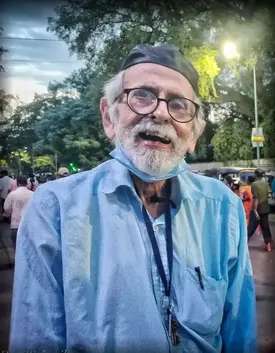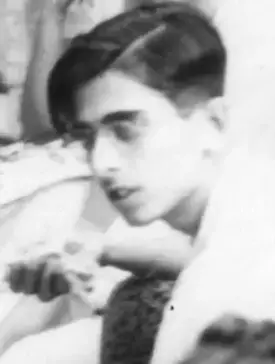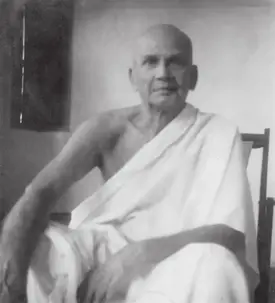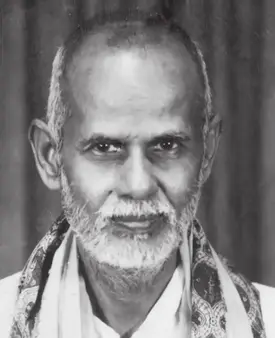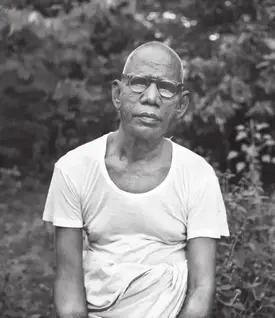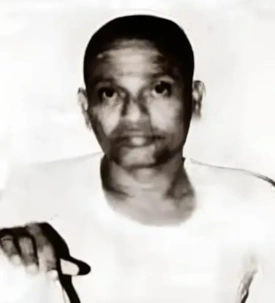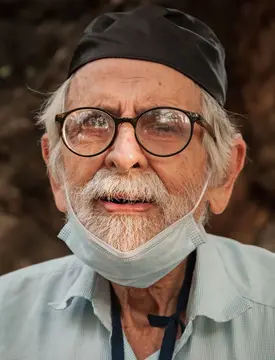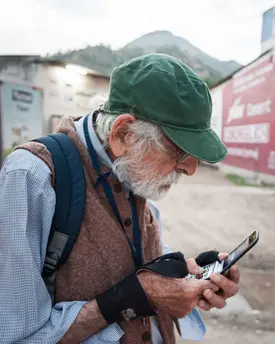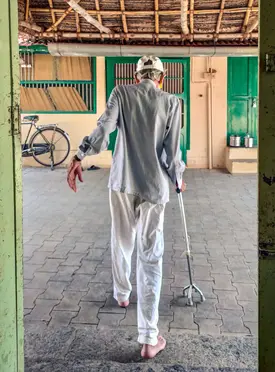Table of Contents
In Profile: Sri Dorab Framji (1931-2023)
Ramana Reflections: Bhagavan and Cinema
Announcement: Mahapuja, 12th June 2023
Sri Bhagavan’s Ayurvedic Recipes
Events: Alagammal’s Mahanirvana Chanting
Dear Devotees,
The Ashram regrets to announce the demise of Sri Dorab Framji, age 92, who passed away on Tuesday night, 23rd May. In this issue we offer a brief
tribute to his life
Devotees have edited, subtitled and uploaded two of the seven films that Bhagavan saw in the Ashram Dining Hall in 1946 with help from Dorab’s father. For the story of Ashram Cinema and links to the uploaded films, see Ramana Reflections: Bhagavan and Cinema
In Profile
Sri Dorab Framji (1931 - 2023)
Dorab Framji first met Bhagavan as a boy of twelve. It was in early July 1943 when he and his family came to the Ashram for the first time. His father, Framji Dorabji had a spiritual bent from early childhood and had always been keen to seek out saints.
Dorab’s father heard of Sri Bhagavan from his brother, Dadiba, who had read a review of Paul Brunton’s A Search in Secret India in The Sunday Times. He advised Framji to go and see Bhagavan. Framji took up the suggestion and in 1937, he and a party of four made the journey from Mumbai to Sri Ramanasramam. The moment Dorab’s father saw Bhagavan, he felt extraordinary veneration for him and was immediately convinced that here at last was the master whom he had been seeking his whole life. Though the distance from Bombay was great, Dorab’s father could not stay away from Tiruvannamalai and made the journey each year.
In the early 1940s, Dorab’s father found the opportunity to shift his business from Bombay to Madras and was thus enabled to make monthly visits to the Ashram. Now the whole family was near Tiruvannamalai and Dorab, along with his mother and sister, got to meet Bhagavan. In no time, the entire family were devotees and visited the Ashram frequently. They purchased a cottage near the Ashram and eventually came to regard Tiruvannamalai as their home.
If the financial fortunes of Dorab’s father had suffered in the final years at Bombay, when he shifted to Madras and to Bhagavan, everything turned around, and his business, which now included the newly established Wellington Talkies in Madras, began to prosper.
When Dorab and his family came for Bhagavan’s darshan, they never spoke or asked Bhagavan questions but were content to sit quietly in the Master’s presence. Whatever questions they might have had were invariably answered in the replies given to other devotees.
Dorab witnessed Bhagavan’s compassion, even in very simple ways. During his first visit, he sat opposite Bhagavan at breakfast. Having lived all his life in Bombay, Dorab was not familiar with South Indian cuisine and had never eaten iddlis before. On tasting them, he found he was not very keen on them. Bhagavan took notice and quietly gave instructions to the kitchen. The following morning when the father and son came for breakfast, the child was astonished to see that his iddlis had been lavishly smeared with ghee and covered with jaggery, a modification that dramatically altered his opinion of them.
Around this same period, Dorab came out of the Dining Hall one day and just jumped for joy, throwing his handkerchief in the air. At the time, he didn’t know why he was so happy but later he understood that it was just being near Bhagavan.
Dorab used to eat very slowly when in Bhagavan’s presence, because he observed that Bhagavan, ever courteous, would wait for him to finish his meal. This way he got to be with Bhagavan a little longer at mealtime. Bhagavan, of course, never let on that he was waiting but would occupy himself with one or another thing, looking here and there while cleaning his teeth with a toothpick.
During another meal in the Dining Hall, Bhagavan advised Dorab not to drink water before having his meals, advice the youngster would follow for the rest of his life.
As he came of age, he would sometimes visit the Ashram without his family. Bhagavan, ever solicitous for the welfare of devotees, would invariably inquire if the youngster was well and had everything that he needed.
Once when Dorab was in his late teens and by this time had taken to reading poetry, he came to the Ashram to ask Bhagavan if he should give up his life in the world and come to stay permanently in Tiruvannamalai. He sat down before Bhagavan in the Hall and closed his eyes. Just then a line from Wordsworth’s 'Skylark’ came to mind: Type of the wise who soar, but never roam; True to the kindred points of Heaven and Home![2]
Dorab knew that Bhagavan was telling him to give up the idea and thus he never opened his mouth. He later spoke about Bhagavan’s darshan, how Bhagavan had ‘compassion oozing out from his eyes’. Dorab could never forget how on full moon days when Bhagavan was cleanly shaven and would apply the three lines of vibhuti on his forehead, ‘he looked like Lord Siva Himself!’
Bhagavan’s Mahanirvana
Dorab and his family were in Tiruvannamalai for the last fortnight of Bhagavan’s earthly life. One day about a week before the Mahanirvana, Dorab’s father joined the queue for the evening darshan. While he waited his turn, he silently chanted prayers from the Zend Avesta, the collection of Zoroastrian religious texts written in the Parsi scriptural language (Avesta), a sister language of Sanskrit. While he was facing East doing his morning Sun prayer, Dorab came and told him they could now go and have Bhagavan’s darshan.
Dorab’s father continued reciting the prayer under his breath as he came before Bhagavan. He prostrated before Bhagavan three times, whilst silently continuing with his prayers: ‘We do homage to Thee, O Rising Sun.’ Bhagavan eyed him steadily and then said with a serene smile, ‘Framji, the Sun is setting’. Hearing these words, Dorab’s father knew that the end was near.
Dorab later recalled how Bhagavan had repeatedly said that devotees must find the real Ramana within their hearts else they would be sorely disappointed when he left his body. Even those for whom this last admonition was taken to heart found the loss very difficult. It was only ‘with the lamp of faith’, Dorab once said, that devotees were able to find fulfilment after Bhagavan left the body.
Following Bhagavan’s Mahanirvana, Dorab and the family continued to visit Tiruvannamalai. Dorab keenly noticed Bhagavan’s absence in the physical form but for some period of time, there were not really any devotees around either. While in Tiruvannamalai during this period, he used to sit and meditate next to Bhagavan’s samadhi, under the open sky with the moon above and felt perceptibly and powerfully Bhagavan’s presence even if everyone else seemed to have disappeared. In the years that followed, devotees slowly returned to Tiruvannamalai.
In 1965, Dorab came to the Ashram in his car. When he saw Ganesan, he asked him to get in, which the latter did. Dorab drove to Chennai. On the way, he queried, ‘At the Ashram, when I asked you to get into the car, you did not ask where I was taking you.’ Ganesan replied, ‘Dorab, I know you will only take me to a place that will elevate me!’
He was happy with this reply and revealed, ‘Yes, I am taking you to Vasant Vihar in Adyar for a talk by a great sage called, J.Krishnamurti.’
The very first sentence that Krishnamurti spoke was potent: ‘If there is no truth within you sir, take it for certain that there is no truth outside of you!’ Contemplating this single sentence, Ganesan felt that it conformed with Bhagavan’s own teaching that 'I AM' is the truth.
Satsangs at Dorab’s House
The cinema, Wellington Talkies in Madras was a de facto Ramanasramam away from Ramanasramam and served as a layover for devotees visiting Chennai. The large residence on Mount Road not far from Spencer’s with its spacious rooftop overlooking the city was a local landmark. Next door to the restaurant Buhari’s and near the Connemara Hotel and Higginbotham’s flagship bookstore just down the way, Western devotees stopped in on their way to and from India to enjoy the family’s hospitality.
Devotees from Ramanasramam also found a welcome home with the Framjis during their visits to Chennai.
Dorab got to spend time with Muruganar over the years and moved very freely with him. Some elders would behave in an elderly way with him but Muruganar treated him like an equal, not as a spiritual authority whose every word was gospel. Muruganar also came to visit the Framjis in Chennai and in the poet’s latter years stayed for extended periods while undergoing medical treatment.
When the family was in Tiruvannamalai, devotees often gathered at the Framji residence to share reminiscences about Bhagavan.
Dorab invited the staunch scholar devotee, Sadhu Natanananda, author of Ramana Darśanam to set up residence within the family compound. Sadhu Natanananda (born Natesa Mudaliar) had been a schoolmaster until he met Bhagavan in May 1918 for the first time at Skandasramam. He edited Self-Enquiry in the question-answer format and subsequently wrote Upadesa Manjari (‘Bouquet of Spiritual Instructions’) where he brought out Bhagavan’s words heard by him at different times. Sri Ramana Darśanam describes aspect of truth and the qualities of a jnani in a narrative divided into ten scenes.
Dorab had been thrilled to learn that Sri Natanananda, about whom very little was known, was still in Arunachala. Dorab traced him and was quite distressed to see such a great devotee living in a dreary thatched shed for refugees from war-ravaged Burma. He pleaded with the sadhu to shift to his house near the Ashram of the Master. Sri Natanananda who Dorab reverently referred to as ‘Swamiji’ at last agreed on the condition that it should be his only residence thenceforth. The promise was given and the author shifted to Dorab’s house, elevating the regular satsangs with his innumerable memories and insights into the teaching.
Sri Muruganar, the legendary Tamil poet, Natananada, author and scholar, Lakshmana Sarma who had private lessons from Bhagavan on Ulladu Narpadu, and Sadhu Om, the gifted virtuoso in Tamil prosody and verse who in hundreds of verses and songs had praised Bhagavan and illumined his teachings, would sit together and share on Bhagavan. Dorab loved to recall the gatherings of this quartet of great devotees at his home in the early 1960s.
Muruganar’s Last Days
In late August 1973, when Dorab and his father came to see the ailing Muruganar at his quarters in the Ashram, Muruganar appeared very frail. Dorab’s father who was also advanced in years, walked into the room with the support of a cane. He approached Muruganar sitting up in bed and placed his hand on his shoulder. Muruganar looked up and the two gazed at each other for a few minutes, as if they knew that this would be their last meeting. After this moving exchange, Framji simply turned and walked out just as silently as he had come in.
Muruganar passed away two days later. On the day of his demise, devotees were gathered at his room in the Ashram. Amid the atmosphere of sadness and grief, Dorab intoned Aksharamanamalai and all joined in, lifting everyone’s spirits.
Dorab’s father passed away two years later in November 1975. As Dorab was very close to his mother, it was only after her death that he shifted permanently to Tiruvannamalai.
When Sadhu Natanananda passed away in 1981, Dorab constructed a small samadhi for him along side his cottage. He took care to preserve the sadhu’s letters as a precious treasure and always wanted their content to be translated into English. He described Natanananda as a ripe jack fruit, rough on the exterior, but all sweetness within, Sri Muruganar was a coconut, nutritious on the inside but one had to crack the shell, i.e. the difficult Tamil verses, to access it and Sadhu Om was the ripe plantain fruit.
In Later Years
Dorab was one-pointed in his love and devotion to Bhagavan and made the effort to come to the Ashram no matter how difficult walking became for him. In Margazhi month[1], Dorab would come and listen to Vishnusahasranama each morning at 5 am. It was only in the last couple of years that he was unable to continue. He once commented, ‘The beauty of sadhana is that it makes the sadhak soft and gentle, and the hard crust of the ego gets broken by virtue of the love that has entered the heart.’
Though mostly a spiritual seeker, Dorab was excellent at business and managing finance. Over the course of his life, he gave family members astute financial advice. He used to drive from Mumbai to Chennai when he was younger and in later years, enjoyed taking the train.
He was ever the gracious host and devotees that were invited to his house for tea and snacks experienced hospitality in full measure while also being regaled with stories from days gone by.
During the second COVID wave in Tiruvannamalai (Delta variant) in May 2021, Dorab fell sick and was hospitalised. His youngest grand niece, Maneck who is a medical doctor flew down from Mumbai and looked after him in the hospital. The first day she ‘thought he wouldn’t make it. But he was cheerful and positive and pulled through in spite of the difficulties.’ He had difficulty breathing and his recovery was slow. Before COVID his memory had been excellent, she noted, and he could ‘recite prose and verse by rote’. But after COVID, he lost a bit of his memory, even though he continued to be an avid reader.
When he was discharged, Maneck persuaded him to come to Mumbai with her so that the family could better care for him. When in Mumbai, Dorab said he felt Bhagavan’s presence and did not feel the urge to be in Tiruvannamalai. And yet, he could not stay away from the Ashram and wanted to be sure that he ended his life in Tamil Nadu, near his beloved Guru and the Holy Hill. Even though his family strongly advised against it, he returned. Once in Tiruvannamalai, Dorab who treasured solitude, resumed his favourite pastimes, namely, sitting in meditation in his armchair on the veranda of his Ramana Nagar cottage and reading books from his extensive library collection.
In late April 2022 while walking through the Ashram gardens, Dorab took a fall and broke his hip. Hospitalized, devotees and family members came to visit him but were surprised to find him pacing the halls of the hospital with the use of his walker. All efforts to get him back into the sickbed were in vain. The Ashram management often marvelled, ‘How Dorab crossed the busy road to come into the Ashram each day was a daily miracle!’ But this was his way of life.
Dorab had always reasoned that the secret to long life is daily exercise. ‘At this age`’ he said, ‘if you lie in bed all the time, the muscles of the body will atrophy, and your life will be over in no time.’
When his close friend, Ashram administrator, V.S.Mani passed away in July 2022, Dorab insisted on walking the whole way to the cremation ground with his walker and resisted numerous offers of a lift.
He would regularly come to collect his lunch from the Ashram, declining home delivery. Dorab was adamant in moving to and from the Ashram under his own power, a discipline he maintained right up till the end.
Another devotee remarked how he loved having tea with Dorab in his "old fashioned house with it’s wooden, wire-netted veranda which reminded him of the bungalows of Assam." He said, "We were both a bit deaf. He’d shout at me, and I’d shout back and he’d say ‘Oh yes’, or the other way round!"
Devotees recalled his solicitude with newcomers offering them his assistance. Dr.Lakshmi her first day in the dispensary in 2017 is one such example. Dorab walked straight in to meet her around 10 am, saying ‘I heard a young doctor from London has relocated to Bhagavan, and you see ... you are blessed. It’s all his call. We will meet whenever you want.’ In subsequent email exchanges, he would often quote Bhagavan, ‘Paying attention to attention is attention. Such attention paid to the Self leads to wisdom.’
In recent months, there was a change in Dorab’s condition. In April this year, he complained of failing health. His left eyelid had begun to droop (ptosis) and drooped so badly that he was only in actuality using one eye. Worse still was the vertigo which caused him to bump into walls and suffer falls while moving around his house. He lost the keenness of sight in his good eye from glaucoma, had a sinusitis condition, a heart rate in the low 30s, and dizziness because of that. During spells when he felt like he was falling, he just repeated, ‘Bhagavan, Bhagavan!’ and that is how he coped. Without the least trace of self-pity, he accepted that ‘one has to live out the time destined’ but hastened to add ‘I have no complaints. Bhagavan is very kind!’
In March this year, the Ashram President, Dr.Venkat S.Ramanan, went to visit Dorab in his house and sat with him for an extended period to discuss a life with Bhagavan. Dorab spoke of the eighty years since first meeting Bhagavan and told how Bhagavan would bring some change and growth in the devotee very rapidly and then the path might be ‘a slow ripening process’. He warned that ‘for years we will feel that we have made no progress’. But "we are in Bhagavan’s hands" would be the final message at parting from the door of his cottage.
One devotee recalls how Dorab came looking for her because he wanted something written by Muruganar (of which he had a hand written copy) to be translated into English. Fortunately Robert Butler was in Tiruvannamalai at the time and he made himself available to do the work. This little booklet has now been published under the title, The Disciplines that Are Essential in the Spiritual Aspirant.
In recent months when once quoting Sufi verses from Hafiz, Rabia, Kabir and others, he cited "Didn't I Tell You,"[2] alerting the listener to the 'illusory nature of the world'.
He also once said, reflectively, ‘The finer the fuel, the brighter the flame; Christ may be born a thousand times in Bethlehem, but until he is born in our hearts, there’s no meaning in it.’
All who knew Dorab know how fiercely private he was. Those within his inner circle enjoyed the pithy pearls of wisdom that flowed freely from his insightful mind, unerringly on point, guided by an inner moral compass that had Bhagavan as its centre.
These precious insights were, of course, strictly embargoed: not for public consumption, and not to be repeated or shared with others. His wide-ranging observations on Bhagavan, sadhana, literature, politics, jokes, or the practical business of daily living arose spontaneously in his mind, and the lucky listener was assured of a fresh stream of satsang on every occasion. Such was his surrender to the flow of life that it felt sacrilegious to attempt memorizing or even making mental notes of what he said, however unique and striking they were.
Such visitors also know that it was impossible to cheat him. Dorab had a finely tuned sixth sense. One visitor, confident that he would be unobserved and undetected, casually switched on the voice recorder of his mobile phone when Dorab’s back was turned. Dorab continued as if nothing had happened, and then, as the conversation resumed, he suddenly shot the question: ‘Are you recording this?’ ‘No Dorab!’ was the answer, as the guilty party casually switched off the offending app when the next unobserved moment presented itself, and deleted the file as well, unheard.
Dorab mellowed and relented in his last years, given an increasingly frail body that he kept ambulatory with superhuman perseverance. One visitor, admitted into the intimate space of his bedroom, which was strewn with a mass of papers and various objects, dared to take a few respectful if surreptitious snapshots. Detection was unavoidable.
‘Are you taking photographs?’ Dorab demanded. ‘Yes, Dorab,’ the visitor confessed. A pause. And then Dorab so kindly added, ‘OK. All right. What is there? You see, I used to be very strict. Now my life is an open book.’
It will not be betraying any confidences to mention that Dorab had begun writing his thoughts in a notebook in his spidery hand. A devotee from abroad, who had visited Dorab on multiple occasions earlier this year, was treated to select passages that Dorab read aloud to him. ‘Pearls of wisdom,’ said the visitor later. One day, perhaps, with the blessings of his family and heirs, Dorab’s writings will see the light of day.
One devotee recounted how when she and her husband were staying in the Ashram in January this year, Dorab came to the Ashram with homemade sandwiches, drinks, and other snacks for them to have on their journey, something he always did for them over the years before they took leave.
Just a week before the accident, two long-term devotees received a phone call from Dorab. Over the decades of their friendship, Dorab had made it a habit to stop by and visit them ever so often, and sometimes told stories from the olden days. In this recent conversation, however, he related how he was experiencing dizziness and couldn’t see or hear very well. Thus, instead of coming to their house, as was his custom, he asked them to come see him at home as he had some things he wanted to tell them, things he had never told them before. Unfortunately, this meeting never took place.
On Tuesday evening 23rd May, just ten days after his 92nd birthday, Dorab was struck by an auto rickshaw and suffered a head injury. This happened at around 6.45 pm near the Dakshinamurthi shrine in front of Ramanasramam. Someone informed an Ashram staff member who came to the scene and found Dorab on the ground. He called an ambulance, but when it was slow in coming, he made the decision to engage an auto rickshaw and rushed Dorab to the local GH. Dorab was lucid and alert en route, and even spoke. When it was determined that he had suffered a serious head injury, he was transferred to GH, Adukampaarai, Vellore, but, alas, too late. Dorab passed away at 12.10 am in the early morning of 24th May.
Numerous devotees have written to the Ashram expressing their sense of loss, each one offering heartfelt testimony about the wonderful interactions they had with Dorab over the years. Each spoke of his abiding faith in Bhagavan, his kindness toward devotees and the sincerity of his spiritual search. One devotee recounted how when she and her husband were staying in the Ashram in January this year, Dorab came to the Ashram with homemade sandwiches, drinks, and other snacks for them to have on their journey, something he always did for them over the years before they took leave.
All of us are grateful that Dorab got to spend the final days of his life near Bhagavan. Dorab will be missed by family members and devotees alike, and by so many for whom he remained such a good friend until the very end.
Dorabji is survived by his nephew Darius and his two grand nieces, Rashna and Maneck.







On the thirteenth day Dorab’s ashes were interred in his compound adjacent to the samadhi of Sadhu Natanananda
Editor’s note: The Ashram management has obtained permission from the Highway Dept. to construct two speed bumps across the road in front of the Ashram. Photos in this article printed with the permission of Dev Gogoi.
Margazhi - mid-December to mid-January
Didn't I tell you, Don't run away from me,
Didn't I tell you, in this empty fantasy.
Even if for centuries you wander angrily;
You'll never find another true companion like me.
I'm your source of Life and your final Destiny
you'll have to come back Home to me.
Didn't I tell you, things are not as they seem;
Didn't I tell you, this world is really just a dream.
A play of shadows and Light dancing on the screen,
a multi-colored magic show cast by a mighty Beam
But if you go inside and takei a peek behind the scenes,
there you will find only me
Didn't I tell you, You're a little fish and I'm the sea
Didn't I tell you, Repose in me cheerfully;
On dry land you’ll find only pain and agony
Stay where you are suited to find comfort and peace
In my boundless waters you can dance and feel at ease
Your happiness lies here with me.
Didn't I tell you, Don’t get caught in the net;
Didn't I tell you, Later on you’ll regret;
Like a blind bird that falls for the hunter’s tasty bait
You’ll only see the danger when it’s too late
I’m your wings, your power to soar effortlessly
Come to me if you want to be free.
Didn't I tell you, Watch out for that band of thieves;
Didn't I tell you, It’s their nature to deceive;
They’ll snatch away your fire and they’ll lead you astray
They’ll leave you cold and empty and make you lose your way
I’m your fire, your heartbeat, your vital energy
Your life breath is only in me.
Didn't I tell you, You’ll get covered with filth;
Didn't I tell you, Don’t worry how things will turn out;
Didn't I tell you, Keep your faith firm and have no doubt;
I’m your wise creator, I’m with you everywhere
Everything is in my hands although you’re not aware
I’m the Master Planner, arranging your affairs
It’s all set in order by me.
Didn't I tell you, Our journey is the way of Love;
Didn't I tell you, You’ll be guided from above;
If your heart is full of light it will help you to see
The path that will lead you right back home to me
Know that love’s the final goal and love’s the secret key
That will open the doorway to me.
Ethereal minstrel! pilgrim of the sky!
Dost thou despise the earth where cares abound?
Or, while the wings aspire, are heart and eye
Both with thy nest upon the dewy ground?
Thy nest which thou canst drop into at will,
Those quivering wings composed, that music still!
To the last point of vision, and beyond,
Mount, daring warbler! that love-prompted strain,
('Twixt thee and thine a never-failing bond),
Thrills not the less the bosom of the plain:
Yet mightst thou seem, proud privilege! to sing
All independent of the leafy Spring.
Leave to the nightingale her shady wood;
A privacy of glorious light is thine,
Whence thou dost pour upon the world a flood
Of harmony, with instinct more divine;
Type of the wise who soar, but never roam;
True to the kindred points of Heaven and Home!


